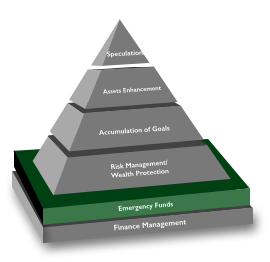Emergency Funds: A fund that is set as a reserved that shall be use only at times of emergency.
What are the possible scenarios for Emergency Funds to be activated.

Retrenchment
When you receive an unpleasant news on retrenchment and your next ideal job doesn’t come in time to pay your bills in the subsequent months, especially when you have heavy financial loans to finance, you will definitely not only be financially affected but also emotionally.
Experiencing Total Permanent Disability
Typically, when you have a Insurance Policy covering Total Permanent Disability (TPD), the insurance pay out might only paid up after 6 months of continuos disability. To make things worst, some insurance policies will pay in intervals of 5 years, 10% for the first 4 years and remaining 60% in the last year. For disability due to accident and if it involves the police, e.g. car accidents, or accident involving death of another party, this will take indefinite period as the court needs to assess the validity of the “accident” before Insurer can pay out.
What happens if you do not have this fund available when crisis strike?
In the case of retrenchment, you will be emotionally affected with worries of how to pay your bill in the next few months, resulting in a state of desperation. When one is desperate, one will make illogical decision, such as taking up a non ideal or non preferred job, selling off any available investments which will result in lost in profit as timing is not right, further increasing your bad debts when you can’t do timely repayment.
In the case of Total Permanent Disability, when income replacement do not kick in timely, your family members or love ones will be both financially and emotionally affected. This impact will be most drastic on top of retrenchment because, you can no longer work for an income and at the initial stage, you will need nursing attention, which means a family member instead of working to sustain the already affected income flow, are required to divert attention on you. Not to forget additional expenses is now required to aid you as a dependant (from a bread winner). The is definitely an immense impact to the whole family.
There are definitely other scenarios which will require an emergency fund to help you go through emergency situation. For example, if you are a business owner when your finance can’t turn over in time and your family will have an emergency fund to fall back upon. Accidental issues, major bills which were overlooked or unanticipated, etc…
How much Emergency Fund is ideal
An emergency fund is definitely an important aspect in financial planning. It need not be an amount as huge as your insurance policies of a few hundred thousand dollars. We are talking about only 3 to 6 months of either your monthly expenses or income. depending on your preferences.
- 6 months expenses shall be the bare minimum when all your bills, insurance policies, loan repayment, daily expenses are all handled. If your monthly income is $4,000 and expenses is $2000, a $12,000 should be set aside.
- 6 months income will be preferred as on top of your necessary needs being handled, your regular investments will still be on track. if your monthly income is $4000, a $24,000 should be set aside.
3 to 6 months is a recommendation, however, depending on your income and expenses if well manage, you might need lesser.
Assuming you’ve spent, a few years to build up your emergency fund, you can stop building this and leverage on Financial Tools to help you retain the value against inflation or better still grow along side with your expenses. This will ensure a consistence growth and you do not lost it’s monetary value over time.
So let us take a look at what are the available Financial Tools which you can consider holding your Emergency Funds aside from a typical savings account. This tool should allow accessibility and easily liquidated. Generally, tools of such nature doesn’t fetch attractive returns. Conservative Investment Funds with regular dividend can be considered with cautions.
